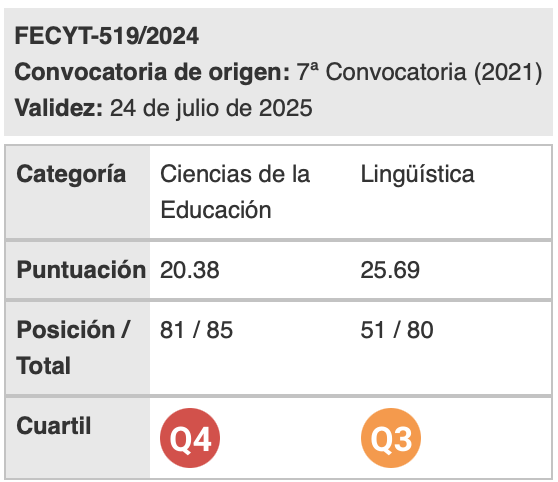‘We deliberately set high demands for the gold standard’... Inclusive and exclusive pronouns in two social science cultures
Keywords:
scientific writing, pronouns, discourse community, contrastive linguisticsAbstract
Intercommunication among the members of academic discourse communities is usually achieved through certain defined genres that aim to achieve the community’s goals. As a result, language analysts have focused their attention on how scientists from different fields manipulate their readership by using personal pronouns and persuade the reader of their claims. This study analyses the use of inclusive and exclusive pronominal signals in English and Spanish research articles and investigates whether there are differences between the two languages in terms of pronominal signals frequency and usage. A corpus of 60 research articles in English and Spanish in the fields of linguistics, education and psychology was used to analyse the pronominal items. The close qualitative analysis of items indicates that the use of exclusive pronouns is higher than inclusive ones in both data sets, and that the most common type of pronoun in both inclusive and exclusive uses is we/nosotros. However, the English speaking community shows an overall higher rate of personal pronouns. The results may indicate a tendency from the English speaking writers’ to self-promote their competence as researchers in an international discourse community, whereas the Spanish speaking writers prefer to detach themselves from their propositions in a more national community.
DOI: 10.1400/229694
Downloads
References
Atkinson, D. (2004). Contrasting rhetorics/contrasting cultures: Why contrastive rhetoric needs a better conceptualization of culture. Journal of English for Academic Purposes, 3, 277-289.
Bernhardt, S. A. (1985). The writer, the reader and the scientific text. Journal of Technical Writing and Communication, 15, 163-174.
Biber, D., Conrad, S. & Reppen, R. (1998). Corpus linguistics: Investigating language structure. Cambridge: Cambridge University Press.
Carciu, O. M. (2009). An intercultural study of first-person plural references in biomedical writing. IBERICA, 18, 71-92.
Cargill, M. & Burgess, S. (2008). Introduction to the special issue: English for research publication purposes. Journal of English for Academic Purposes, 7, 75-138.
Chávez Muñoz, M. (2013). The ‘I’ in Interaction: authorial presence in academic writing. Revista de Lingüística y Lenguas Aplicadas, 8, 81-104.
Connor, U. (2004). Intercultural rhetoric research: beyond texts. Journal of English for Academic Purposes, 3, 291-304.
Crystal, D. (2003). English as a Global Language (2nd Ed). Cambridge: Cambridge University Press.
Filimonova, E. (2005). Clusivity: Typology and case studies of inclusive-exclusive distinction. Amsterdam: John Benjamins Publishing.
Harwood, N. (2005a). ‘Nowhere has anyone attempted... In this article I aim to do just that’. A corpus based study of self-promotional I and we in academic writing across four disciplines. Journal of Pragmatics, 44, 1207-1231.
Harwood, N. (2005b). ‘I hoped to counteract the memory problem, but I made no impact whatsoever’: Discussing methods in computing science using I. English for Specific Purposes, 24, 243-267.
Harwood, N. (2005c). ‘We do not seem to have a theory... The theory I present here attempts to fill this gap’: Inclusive and exclusive pronouns in academic writing. Applied Linguistics, 26, 343-375.
Harwood, N. (2006). (In) appropiate personal pronoun use in political science: A qualitative study and a proposed heuristic for future research. Written Communication, 23, 324-350.
Harwood. N. (2007). Political scientists on the functions of personal pronouns in their writing: An interview-based study of ‘I’ and ‘we’. Text & Talk, 27, 27-54.
Hickey, L. (2005). Politeness in Spain: Thanks but no thanks. In L. Hickey, & M. Stewart (Eds.), Politeness in Europe (pp. 317-330), Clevedon: Multilingual Matters.
Holliday, A. (1999). Small cultures. Applied Linguistics, 20, 237-264.
Hyland, K. (2001). Humble servants of the discipline? Self-mention in research articles. English for Specific Purposes, 20, 207-226.
Hyland, K. (2002). Authority and invisibility: Authorial identity in academic writing. Journal of Pragmatics, 34, 1091-1112.
Hyland, K. (2003). Self-citation and self-reference: credibility and promotion in academic publication. Journal of the American Society for Information Science and Technology, 54, 251-259.
Hyland, K. (2004). Patterns of engagement: Dialogic features and L2 undergraduate writing. In L. Ravelli & A. Ellis (Eds.), Analysing academic writing (pp. 5-23). London: Continuum.
Hyland, K. (2005a). Stance and engagement: A model of interaction in academic discourse. Discourse Studies, 7, 173-192.
Hyland, K. (2005b). Metadiscourse. London: Continuum.
Ivanič, R. (1998). Writing and identity: The discoursal construction of identity in academic writing. Amsterdam: John Benjamins.
Janney, R. W. (2002). Cotext and context: vague answers in court. Language & Communication, 22, 457-475.
Kim, C. K. (2009). Personal pronouns in English and Korean texts: A corpus-based study in terms of textual interaction. Journal of Pragmatics, 41, 2086-2099.
Kim, C. K. & Thompson, G. (2010). Obligation and reader involvement in English and Korean science popularizations: A corpus-based cross cultural text analysis.Text & Talk, 30, 53-73.
Kuo, C. H. (1999). The use of personal pronouns: Role relationships in scientific journal articles. English for Specific Purposes, 18, 121-38.
Lorés-Sanz, R. (2011). The construction of the author’s voice in academic writing: the interplay of cultural and disciplinary factors. Text & Talk, 31, 173-193.
Lujan, M. (1999). Expresión y omisión del pronombre personal. In Bosque- Munoz, I. & Demonte-Barreto, V. (Eds.), Gramática descriptiva de la lengua española (pp. 1275-1315). Madrid: Espasa.
Markus, H. R. & Katayama, S. (1991). Cultures and the self: Implications for cognition, emotion, and motivation. Psychological Review, 98, 224-253.
Martinez, I. A. (2005). Native and non-native writers’ use of first person pronouns in the different sections of biology research articles in English. Journal of Second Language Writing, 14, 174-190.
Molino, A. (2010). Personal and impersonal authorial references: A contrastive study of English and Italian Linguistics research articles. Journal of English for Academic Purposes, 9, 86-101.
Mur-Dueñas, P. (2007). ‘I/we focus on’: A cross-cultural analysis of self-mentions in business management research articles. Journal of English for Academic Purposes, 6, 143-162.
Myers, G. (1989). The pragmatics of politeness in scientific articles. Applied Linguistics, 10, 1-35.
Pennycook, A. (1994). The politics of pronouns. ELT Journal, 4, 173-178. Ramanathan, V. & Atkinson, D. (1999). Individualism, academic writing, and
ESL writers, Journal of Second Language Writing, 1, 45-75.
Scott, M. (2012). WordSmith Tools version 6. Liverpool: Lexical Analysis Software.
Sheldon, E. (2009). From one I to another: Discursive construction of self- representation in English and Castilian Spanish research articles. English for Specific Purposes, 28, 251-261.
Starfield, S. & Ravelli, L. J. (2006). ‘The writing of this thesis was a process that I could not explore with the positivistic detachment of the classical sociologist’: Self and structure in New Humanities research theses. Journal of English for Academic Purposes, 5, 222-243.
Stirling, L. & Huddleston, R. (2002). Deixis and anaphora. In R. Huddleston & G. K. Pullum, The Cambridge grammar of the English language (pp. 1449-1564). Cambridge: Cambridge University Press.
Tarone, E., Dwyer, S., Gillet, S. & Icke, V. (1998). On the use of the passive in two astrophysics journal papers. English for Specific Purposes, 17, 123-140.
Tang, R. & John, S. (1999). The I in identity: Exploring writer identity in student academic writing through first person pronoun. English for Specific Purposes, 18, 23-39.
Thompson, G. & Thetela, P. (1995). The sound of one hand clapping: The management of interaction in written discourse. Text, 15, 103-127.
Vassileva, I. (2001). Commitment and detachment in English and Bulgarian academic writing. English for Specific Purposes, 20, 83-102.
Downloads
Published
How to Cite
Issue
Section
License
Authors who publish with this journal agree to the following terms:
- Authors retain copyright and grant the journal right of first publication with the work simultaneously licensed under a Creative Commons Attribution License that allows others to share the work with an acknowledgement of the work's authorship and initial publication in this journal.
- Authors are able to enter into separate, additional contractual arrangements for the non-exclusive distribution of the journal's published version of the work (e.g., post it to an institutional repository or publish it in a book), with an acknowledgement of its initial publication in this journal.
- Authors are permitted and encouraged to post their work online (e.g., in institutional repositories or on their website) prior to and during the submission process, as it can lead to productive exchanges, as well as earlier and greater citation of published work (See The Effect of Open Access).

Revista de Lenguas para fines específicos is licensed under a Creative Commons Reconocimiento-NoComercial-SinObraDerivada 4.0 Internacional License.
























